This isn’t the BookNotes I was going to share this week, but a few conversations — with a devout Trump devotee, with a conservative skeptic, and with a radically Christian part of the resistance — has me in a bit of a funk. Why do we know so many different people, and like them all, mostly? How do smart, Biblically influenced people end up with so many different perspectives? And what’s wrong with all you people who don’t agree exactly with me on everything! Seriously, though: why are things that I think are just cut and dry — like that the FBI (compromised as they have been in many ways in recent years) was right to insist that the former President be held to the facts of the law. That Trump is a dangerously dishonest, bad person; that seems self-evident, but yet…
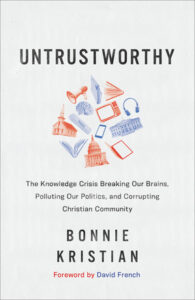 One answer to some of this, as an aside, is found in a very important, forthcoming book on what sources of information and media outlets we trust and how we — especially as Christians — discern true truth from error and propaganda. We’ve already urged BookNotes readers to send us pre-orders for Untrustworthy: The Knowledge Crisis Breaking Our Brains, Polluting Our Politics, and Corrupting Christian Community by Bonnie Kristian (Brazos Press; $24.95 – our sale price = $19.99.) It releases October 11th but we hope to have it a bit early.
One answer to some of this, as an aside, is found in a very important, forthcoming book on what sources of information and media outlets we trust and how we — especially as Christians — discern true truth from error and propaganda. We’ve already urged BookNotes readers to send us pre-orders for Untrustworthy: The Knowledge Crisis Breaking Our Brains, Polluting Our Politics, and Corrupting Christian Community by Bonnie Kristian (Brazos Press; $24.95 – our sale price = $19.99.) It releases October 11th but we hope to have it a bit early.
A current book, somewhat more scholarly, on, among other things, what the author calls “troll epistemology” is The Constitution of Knowledge: A Defense of Truth by Jonathan Rauch (Brookings Institutions; $27.99 – our sale price = $22.39.) We need to be thinking through the deeper questions behind our current polarization.
So. I’m thinking about so-called Christian nationalism and those who see current events through the lens of this broad sense of extreme American exceptionalism, alt-right history, and contemporary aggrievements.
How do those of us who are not part of this deeply angry, MAGA worldview understand it? How should we think about friends, neighbors, and family who are entrenched in it as a serious ideology?
How we talk across political differences and how we cultivate a distinctly Christian view of the government and politics has been a much-discussed topic, here, and we’ll just refer you back HERE or HERE to BookNotes columns written with good book suggestions for those wanting a nonpartisan Biblical orientation on Christian politics. (Some of those books that I reviewed then were in hardback but have since come out in paperback and are less expensive then shown there. Give us a holler if we can help with any of that.)
Here are some that are more current, less about Christian politics in theory and more directly about the rise of Christian nationalism and extreme Red-state ideologies. I mostly want to tell you about this first one, but then I’ll list a few more to round out this urgent BookNotes, two that are by those who might identify as conservatives, by the way, and two specifically for church leaders.
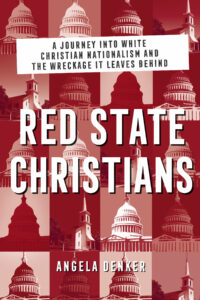 Red State Christians: A Journey into White Christian Nationalism and the Wreckage It Leaves Behind Angela Denker (Broadleaf Books) $19.99 OUR SALE PRICE = $15.99
Red State Christians: A Journey into White Christian Nationalism and the Wreckage It Leaves Behind Angela Denker (Broadleaf Books) $19.99 OUR SALE PRICE = $15.99
I loved this book. I’ve mentioned this before, announcing that it seemed to be a good read, but now that I’ve read it, I’m wanting very much to recommend Red State Christians heartily. It’s unlike many public affairs and current events books in that it is written nicely, with lots of interesting stories of this Lutheran pastor with middle American roots (and a evangelical mega-church past) travelling around the classic sites of red-state religion. From a hip mega church in Orange County to deep south Pentecostal Trumpers, from conservative Lutherans in Missouri to conservative evangelical intelligentsia in DC, she travelled for more than a year conducting first hand interviews and writing about it in lovely prose that puts you in the place, with lots of local color and flavor. She was a working journalist before her call to ministry — in fact, was a pretty well known sports-journalist (as can be seen from her vivid and insightful chapter set in Florida called “Winners and Losers: Trump, Football and Christianity” which could have been a human interest piece in Sports illustrated.) She isn’t afraid to meet people and get behind the scenes for the story.
Here’s three things to know about the book.
Firstly, I think it is somewhat mis-named. It’s done by a publishing house which is mostly progressive and I think the lingo about “the wreckage” is fair enough, but the book shows more sympathy for the people embracing the right wing that such a title suggests. She truly was trying to figure out how the evangelical voting bloc helped the Trump presidency and she did so with grace and appreciation. She disapproves of aligning faith with far right politics, and she is writing for a more liberal audience, to be sure, but, still, she is often talking about her own people, her tribe, in some cases her own older friends and family members. She has a very nice touch and while her goal is to expose as inappropriate the unabashed loyalty to Christian nationalism and Trumpian politics, she is fair-minded and kind.
She addresses this in a passionate new chapter in this edition. She was more eager to build bridges and find common ground back when she wrote the first edition (that carried a less loaded subtitle.) The persistence of the big lie, the politicalization of Covid and the January 6th uprising has made her less calm and her coming to grips with insatiable racism is painfully explained in that new ending.Still, even there, there are a few remarkably tender scenes and signs of hope; Had to when away tears from my cheek as I read.
Secondly, she observes that not all conservative evangelicals are equally happy about Trump’s demeanor, policies, or the Republican Party’s recent support of his extremism. For instance, she meets in a swanky Orange County megachurch some people of color who are helping their congregations struggle with questions of diversity and racial justice— not an easy task in the OC. ) That chapter, called “Bibles and Boob Jobs: The Money and Influence of Orange County Christians” was careful and really interesting. A world away was a great chapter of her own family roots, set in the soil of rural, Midwestern faming communities where she described kids from the local Lutheran church as “free thinking” if rather pro-Trump.
There is another riveting chapter called “Less Conservative, More Consequential: Rural Rust Belt Red State Christians in Appalachia and Central Pennsylvania.” I won’t say much more, but, dang — she’s a good writer, stopping off at an Eat ’N Park and focusing a bit on a young Christian lawyer from Altoona, doing her best to celebrate light and life in that rugged part of the Keystone State. (Note to Angela, though: we here in central Pennsylvania, North and South of Harrisburg, view Altoona as almost Western Pennsylvania. Just saying, sister.) In yet another chapter Denker nicely explores conservative Roman Catholics who are harder on their current Pope than they are their beloved candidate. Fascinating.
Thirdly, I think this book, easy to read as it is, generally gracious and open-minded as it may be, is still a wake-up call to many of us in the faith community to be aware of how deeply odd these times are. What are we to do in our churches when congregational leaders deny that Jesus’s words are important for civic life, when pro-family leaders rave about a pussy-grabber and conservative theologians support a regime unhinged from typical faith traditions of public theology? How odd that many seasoned politicos trusted a corrupt business tycoon with no political leadership skills, only to regret it when it was way too late.
In any case, Red State Christians in its new, expanded edition, is a book I’ve been waiting for, a good guide to thinking helpfully, written in an anecdotal, journalistic way, about the complexities of our faith these days and what to think and do about the diverse American religious and political landscape. It really is a travelogue and exploration of people on the ground — she is neither cynical nor jaded, even as she brings her mainline denominational theology and spirituality into her honest evaluations of the interviews.
And while she was doing journalism and storytelling, not exactly research-based social science, she has a good eye: the Central/Western PA folk, while mostly churched, were not the same as the pro-life Pentecostals in the South. The Lutherans in the Midwest had a different vibe — and different reasons for their support for Trump — than, say, the slicker Lutherans in Southern California. From Texas to Florida to Minnesota, she helps us realize that the religious MAGA movement is not at all monolithic
And, be prepared for some fascinating surprises. She almost liked Paula White, who insists she does not preach a “prosperity gospel” heresy and is deeply committed to racial unity. She dresses up, sure — in a leather jacket — but her church is not glitzy and her people are much less fancy than other Southern megachurches Denker visited. White insisted that she wasn’t that interested in Trump’s politics, but wants him to grow in faith in Jesus, as any good pastor would. Anyway, in a brutal and important chapter on #metoo and #ChurchToo, “Evangelical Women and Donald Trump: Who’s Grabbing Whom?” (including a tangential but powerful interview with Rachel Denhollander) it was a helpful and interesting contribution. From “Red-State Arabs: Christians, Muslims, and Evangelicals in Houston” to “On the Border: Donald Trump and Latinx Christians” we see the conflict in specificity. In a chapter primarily about abortion and another about gun rights, we see the complexity. She tells the story of who the mostly — but not always — far right Red State Christians are. In the new conclusion to the 2022 edition she is more outraged than most of the book indicates, because most of the book is a beautiful testimonial of good storytelling, sociological insight, immersive journalism. It’s a great read.
The new ending includes her being graciously called upon by Red-State relatives to preside at a COVID-death of a relative, her husband’s 43 year-old brother. It is full of pathos — sadness and outrage, aware that some of the politicians and pastors who shunned vaccines and minimized the threat of the pandemic were to blame. This is not theoretical, folks, or distant. This book helps us understand much that we need to understand. Order it today, please.
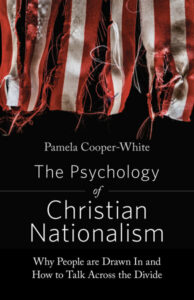 The Psychology of Christian Nationalism: Why People Are Drawn In and How to Talk Across the Divide Pamela Cooper-White (Fortress Press) $21.00 OUR SALE PRICE = $16.80
The Psychology of Christian Nationalism: Why People Are Drawn In and How to Talk Across the Divide Pamela Cooper-White (Fortress Press) $21.00 OUR SALE PRICE = $16.80
I’ve reviewed this already and wanted to give it a mention here, again, It’s a bit more academic, but quite readable and heartfelt. Cooper-White is an Episcopal priest and professor of Psychology and Religion at Union Theological Seminary in NYC (and her husband, Michael, has served as President of the Lutheran Seminary at Gettysburg.) She has just three chapters, chapters that have been called “incisive” as she explores the troubling reality of Christian nationalism, its deep roots, and what to do about it.
Specifically, after documenting the connections between white supremacy and Christian nationalism (and the longing for power) — all of which she calls “Unholy Alliances” — she explores cogently “why people are drawn in by extremists beliefs” which includes “conscious needs and unconscious lures.” Yep, there is some sense that for some, there deepening and unquestioning views are almost showing cult-like tendencies.
There is a lot packed into this chapter, some of it fairly basic (exploring “the need for belonging”) and some of it is fairly sophisticated. All of it is illustrated with stories of people she knows, friends and acquaintances, and stories of her travels into the far right. She mentions being at a biker rally in the summer of 2021, hosted by State Senator Mastriano here in central Pennsylvania. She compares and contrasts the gun-shooting ads of Marjorie Taylor Green and the Eliza Griswold New Yorker article about Shane Claiborne (and his book Beating Guns…) Beyond values and policy questions, she explores the nature of narcissistic leaders and the fascinating psychology of those lured by them.
It covers a lot of ground and we recommend it for one good survey, trying to imagine what is really going on.
This brilliant and courageous book is the best treatment we have of the complex psychological dynamics of the dangerous Christian nationalist movement in America. Without losing sight of the humanity of even the most racist and sexist of our fellow citizens, Pamela Cooper-White has given us a powerful and needed text on just how close we are to losing our democratic experiment. — Cornel West, author Race Matters and Democracy Matters
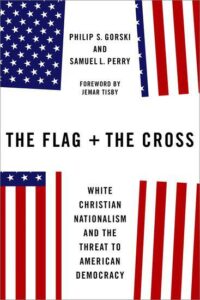 The Flag + The Cross: White Christian Nationalism and the Threat to American Democracy Philip Gorski and Samuel L. Perry (Oxford University Press) $21.95 OUR SALE PRICE = $17.56
The Flag + The Cross: White Christian Nationalism and the Threat to American Democracy Philip Gorski and Samuel L. Perry (Oxford University Press) $21.95 OUR SALE PRICE = $17.56
Again, I’ve named this before, but wanted to list it again. Academic press volumes are peer reviewed and often scholarly, but this is, if deeply researched, still (as Kristin Kobes Du Mez says) “immensely clarifying. She calls it “sobering”and says, “Anyone who cares about the fate of American democracy should read this book.”
I’m very struck by this insightful comment about it by Beth Allison Barr, Professor of History at Baylor University and author of The Making of Biblical Womanhood:
Gorski and Perry make sense of the seemingly senseless January 6 uprising. Built on powerful evidence, they show how white nationalism wove itself into the very fabric of modern conservative values. By making visible the creation of white nationalism, this book gives me hope that we can unmake it.
Barr notes that they “make visible the creation of white nationalism” and by that she means not only the updated and previously unpublished data on the 2020 elections, but, more importantly, the old, old story — going back to the late 17th century. It’s succinct but very helpful. Highly recommended.
Philip S. Gorski, Professor of Sociology at Yale University, is a comparative and historical sociologist who writes on religion and politics in early modern and modern Europe and North America. His work has been featured and discussed in The New York Times, The Wall Street Journal, NPR and other national media outlets. He is the author, most recently, of American Babylon: Christianity and Democracy Before and After Trump (2020) and American Covenant: A History of Civil Religion from the Puritans to the Present (2017).
Samuel L. Perry is a sociologist of American religion, race, politics, sexuality, and families and serves as Associate Professor of Sociology at the University of Oklahoma. He has written for outlets like The Washington Post and Time Magazine, The New Yorker, The Economist, The New York Times, and elsewhere. He is the author or co-author of Growing God’s Family (2017), Addicted to Lust (Oxford 2019), Taking America Back for God (Oxford 2020).
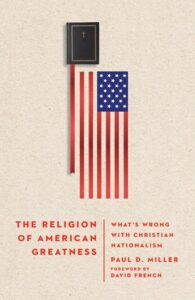 The Religion of American Greatness: What’s Wrong with Christian Nationalism Paul D. Miller (IVP Academic) $30.00 OUR SALE PRICE = $24.00
The Religion of American Greatness: What’s Wrong with Christian Nationalism Paul D. Miller (IVP Academic) $30.00 OUR SALE PRICE = $24.00
Leave it to IVP Academic to write what one observer calls “a compelling vision” and what the always balanced and insightful Amy Black (of Wheaton College) calls, “A refreshingly different approach.” Even the impressive sociologist (see above) Samuel Perry says it is “Beautifully written from a conservative Christian perspective. Miller shows us all a better way.”
“Beautifully written from a conservative Christian perspective. Miller shows us all a better way.”
Many thoughtful scholars — from Karen Swallow Prior to George Marsden to John Inazu — have endorsed this with glorious recommendations. So have public activists like Michael Ware.
I have only begun this magisterial work but here is some of why it is considered different: Miller is trained as a conservative political scientist from Georgetown University. (That in itself might give a hint since that department is known as rigorous and not liberal.) His most recent academic book is on Cambridge University Press, entitled Just War and Ordered Liberty and before that he wrote an important work rejecting calls for American restraint in foreign affairs (entitled American Power & Liberal Order: Conservative Internationalist Grand Strategy,)The scholar knows a bit about this stuff as he has had boots on the ground. He has been the Director of the Afghanistan and Pakistan departments of the National Security Council and served as an intelligence analyst for the CIA. So there’s that.
Not all Christian nationalists are extremists involved in Trump’s big lie or complicit with January 6th insurrection tragedy. But if they care about the constitution and, more importantly, a Biblical sense of prudence and justice, they should read this book. It brings a sober tone for all of us and I’m impressed so far.
The Religion of American Greatness is a superb and essential book―engaging and fair minded, thoughtful and accessible, and oh so timely. It both explains and challenges an increasingly widespread, malicious movement―toxic Christian nationalism―that is doing great harm to America and to the Christian witness. The Religion of American Greatness is powerfully argued, honest, and never ungracious. It’s just the book we need, and Paul D. Miller is just the person to write it. — Peter Wehner, senior fellow at the Ethics and Public Policy Center, author of The Death of Politics
A much-needed and astute analysis of a major reality in the United States, a reality that challenges the very heart of this nation and of Christianity. Dr. Paul Miller brings to bear years of political experience, a deep commitment to Christian understanding, and a wellspring of scholarly comprehension to help us see what ultimately is wrong with Christian nationalism. A must-read. — Michael O. Emerson, professor and Sociology Department head at the University of Illinois Chicago and author of Divided by Faith: Evangelical Religion and the Problem of Race in America
I’ll be recommending this book to every thinking Christian I know who’s looking to understand why nationalism, and Christian nationalism in particular, is such a danger for the church and American democracy. Beautifully written from a conservative, Christian perspective, Paul Miller carefully engages the arguments for both nationalism and Christian nationalism, and shows them to be sorely lacking. Christian nationalism is illiberal, antidemocratic, and ultimately for Christians, unbiblical and inconsistent with authentic gospel witness. Miller shows us all the better way — Samuel L. Perry, coauthor with Philip Gorski of The Flag + The Cross: White Christian Nationalism and the Threat to American Democracy
Paul D. Miller, a politically conservative, patriotic, old-style Republican, offers a thoughtful Christian critique of the most recent versions of Christian nationalism and its antecedents. Conservative Christians who suspect he may be wrong should at least give him a hearing. More progressive Christians can also learn from this balanced and constructive approach — George Marsden, author of Fundamentalism and American Culture
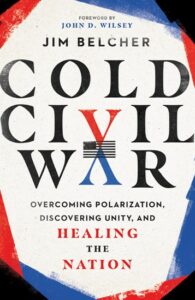 Cold Civil War: Overcoming Polarization, Discovering Unity, and Healing the Nation Jim Belcher (IVP) $28.00 OUR SALE PRICE = $22.40
Cold Civil War: Overcoming Polarization, Discovering Unity, and Healing the Nation Jim Belcher (IVP) $28.00 OUR SALE PRICE = $22.40
I wrote about this before and now seems an ideal opportunity to remind you of it. Jim is an old acquaintance, a man and scholar I admire. (He has worked as a pastor and a Christian college President but his PhD is in political philosophy from Georgetown.) This is a major, thoughtful work and few could have written anything like it.
It is a different sort of book than the others listed here, deeper, really, and it will annoy some (many?) Hear, hear.
As I noted in my earlier announcement of it, I am not sure I love it. We are indeed in a cold civil war and we do indeed need to overcome polarization. But this is not a “let’s find common ground and come together” sort of invitation to gracious deliberation. It is neither Parker Palmer’s generous Healing the Heart of Democracy: The Courage to Create a Politics Worthy of the Human Spirit or Harold Heie’s ambitious Reforming American Politics: A Christian Perspective on Moving Past Conflict to Conversation although he should have cited it. (And while I’m mentioning Harold Heie, you should know his wise little volume done just last year, Let’s Talk: Bridging Divisive Lines Through Inclusive and Respectful Conversations that has nice little contributions by Richard Mouw, David Gushee, and Stan Gaede.) Anyway, the hefty Cold Civil War just isn’t that kind of book.
It is a serious study — and the footnotes alone, complete with lots of video links and website citations are well worth the price of the book for anybody wanting to study deeply in various sides of American political ideology. And it is a more theoretical approach, trying to get deeply at what sorts of varying players are leading the debates, and who is behind it. In this sense, Belcher offers a major contribution (even if I’m not sure he is always correct in his connecting the dots to these scholars, thinkers, intellectuals.)
He is somewhat in the vein of a book I often recommend, the heady but vital Political Visions & Illusions: A Survey & Christian Critique of Contemporary Ideologies by David Koyzis and it seems to inform Dr. Belcher’s “pox on all their houses” attitude. And, with insights from Yuval Levin and Patrick Deneen and natural law guy J. Budziezewski (from a book I bet I sold Jim at a conference years ago), he develops a fascinating four quadrant chart that places thinkers on both a left/right and up/down grid. It’s really the heart of his fascinating project.
Jim studied with Father James Schall (who taught him Plato and Aristotle) and as an evangelical, he linked those historic thinkers with the public theologies of Luther and Calvin and the like. In Cold Civil War his esteemed and serious background and lively faith is evident, even when he’s citing Tucker Carlson or Jim Wallis, Rod Dreyer or Jemar Tisby (not to mention Michael Sandel or Deidre McCloskey.) By the end of his ambitious assessment he argues for a “new vital center” which is somewhat of a synthesis, it seems. Naturally, he draws on DeTocqueville. He believes to get beyond and through all this the church must be heroic. It’s serious stuff, well worth pondering. We’ve got it at 20% off, so if you want a serious work that moves to new ground, order it today.
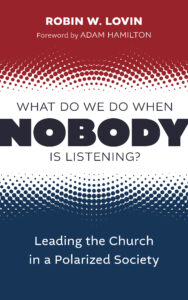 What Do We Do When Nobody Is Listening: Leading the Church in a Polarized Society Robin W. Loving (Eerdmans) $19.99 OUR SALE PRICE = $15.99
What Do We Do When Nobody Is Listening: Leading the Church in a Polarized Society Robin W. Loving (Eerdmans) $19.99 OUR SALE PRICE = $15.99
This is a very good book, useful for sober-minded, thoughtful, Christian people who want the church to bear witness — to be! — a community of moral seriousness and candid discourse. It is an astute work, not breezy or light, but not academic, either. There is a good discussion guide implying that the author and publisher hopes it might be used in small groups, book clubs, adult Sunday school classes or forums. It is trim size and five chapters make it ideal.
The first two chapters are about the problem, studying divisions and polarization. The first chapter explores general cultural polarization and the second is on the church. Along with an excellent, inspiring foreword by Adam Hamilton (who tells of getting to very opposing, both bluntly discouraging emails the same day by angry parishioners calling him either too conservative or too liberal. One said she would never come back, the other substantially decreased their giving) the problem is described and evaluated. This is important.
The next three chapters are aligned under the rubric of “Listening.” We are charged to listen to the Word, to the world, to those who are not heard. The good extra ending chapter invites us to “take up space” and live with a certain sort of gravitas.
Calmly reasoned analyses of our sharply divided society are hard to come by. But Robin Lovin has a gift for summarizing complex cultural movements with a clarity and dexterity that others may only aspire to. Here’s an ethicist and theologian who brings light and hope to dispirited people frustrated by tense and even fighting times. Every pastor interested in helping a faith community stick together should be devouring these pages. — Peter W. Marty, editor The Christian Century
Lovin’s new book causes me to consider the question, ‘How is my congregation taking up space and serving as a witness to our overwhelming reality of God’s love and justice in what too often feels like chaos?’ I am thankful for the way Lovin frames our current reality and for his challenge to be a kind of witness that is different. — Shannon Johnson Kershner, pastor of Fourth Presbyterian Church, Chicago
Robin Lovin graciously reminds us of some things we’d forgotten: that liberal means nothing if it doesn’t mean generous, that conservative means ensuring we never move on from Jesus, that disagreement is the source of most creativity, that faithfulness is tested by entering the marketplace of ideas rather than withdrawing into our bunkers. Crucially, he highlights the question, ‘Who are you listening to?’ as a test of both wisdom and renewal. It would be ironic for any reader coming to this book to require it to confirm ideas already fiercely held. Only read this book if you want to be transformed into becoming a blessing to the stranger who was once your neighbor. — Samuel Wells, vicar of St. Martin-in-the-Fields, London, author of Humbler Faith, Bigger God
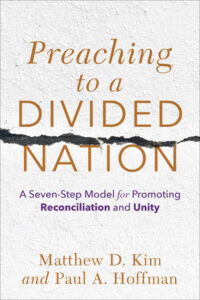 Preaching to a Divided Nation: A Seven-Step Model for Promoting Reconciliation and Unity Matthew D. Kim and Paul A. Hoffman (Baker Academic) $24.99 OUR SALE PRICE= $19.99
Preaching to a Divided Nation: A Seven-Step Model for Promoting Reconciliation and Unity Matthew D. Kim and Paul A. Hoffman (Baker Academic) $24.99 OUR SALE PRICE= $19.99
Oh my, I wish I had time and energy to review this book in greater detail as it is so very interesting, learned, and helpful, rooted, as it is, in a thoughtful, evangelical theological context. Preachers from other faith traditions (especially mainline Protestants) will learn much, even if, at times, the rhetoric is plainspoken and full of admonitions to prayer, to be guided by the Word, and so forth. Nothing disagreeable there, really.
What will be surprising to some who hold certain assumptions about the alleged monopoly of right ring politics or white supremacist attitudes within evangelical churches is just how radical and visionary this stuff is.
Kim (who is of Korean family heritage and tells a heart-rending story about coming to greater insight about that) and Hoffman, who is white (a New England Quaker, no less) each have written previously about racial justice and the like. Professor Kim has an excellent book called Preaching with Cultural Intelligence and Hoffman has a book I’ve highlighted before entitled Reconciling Places which illustrated his public activism for the common good and the sorts of public theology that informs his efforts as an agent of reconciliation. Both of these guys are astute and their footnotes, the sources they draw from and the books they recommend, are excellent.
For instance, they draw wisely on the Oxford University Press paperback by Emerson Divided by Faith, they cite John Perkins and Brenda Salter McNeil, they use the work of Jamie Smith and Sheila Wise Rowe and Tish Harrison Warren. They quote Bible reference tools galore, commentaries, articles on homiletics.
Also, they draw on seminal works from Abraham Heschel and other theological classics, and when discussing standard-fair theology they use Donald Bloesch, J. I. Packer, Leslie Newbigin and John Stott, just for instance. And yet, there are surprising citations and cutting edge mainline scholars represented as well. In other words, they are very well read, delightfully ecumenical, but tilting towards common-sense, evangelical sensibilities. It makes for a solid read.
In a way, I see this as a brand new companion volume — written with a slightly different focus and tone — to the excellent Alban Institute resource from a few years ago entitled Preaching in the Purple Zone: Ministry in the Red-Blue Divide by Lutheran scholar and preacher Leah D. Schade (Rowman and Littlefield; $26.00; our sale price = $20.80.) It gives astute training for her fairly complex plan of a set of sermons shaped, in part, by congregational “deliberative dialogue” sessions. If Kim and Hoffman draw on Timothy Keller and Peter Scazzaro, she draws on the likes of Leonora Tubbs Tisdale (of Yale Divinity School) and her book Prophetic Preaching and John McClure’s Roundtable Pulpit.
The useful framework in Preaching to a Divided Nation, the seven steps, is used to show how to preach to a politically divided congregation, and is attentive to various “isms” — classism, sexism, racism, ableism, and the like. It’s informative but never arcane; it’s nearly a practical field guide to real-world preaching and offers real encouragement for pastors wanting to be more candid and even prophetic in their preaching, They are attentive to these polarizing and fractious times, well aware how careful we must be. They encourage pastors to read widely and listen carefully and to speak judiciously. (That they have to remind preachers not to use racial and ethnic slurs struck me as odd, but I suppose they want to be very, very practical.)
The goal here is not just to sound off on hot topic issues or even to speak more prophetically in the pulpit, but to draw the Body together to a common vision and the mind of Christ. It has a big vision, a healthy view of the scope of redemption and knows that congregational growth and maturity is founded upon the redemptive work of Christ and the lively power of the Spirit. The goal of the book is to help pastors confront the divisions and work towards gospel reconciliation and real transformation in the congregation.
There are little charts and helpful tools to equip you who preach and teach to do it better — and lots of great information about what comes prior to writing the sermon, and what comes after. I’m no preacher and I loved it! It isn’t simplistic but it is clear and I think quite attainable. I think you’ll enjoy it, too, as there are lots of inspiring (and some honest) stories. They admit to learning some of this “the hard way” and that they are still growing as public theologians working for unity in the local church.
To flesh out their approach they not only have sample sermons and ideas and tools, there is an appendix with four excellent sermons, two by Hoffman, one by Kim, one by Sandra Maria Van Opstal, and one by Rich Villodas. There are several other helpful appendices included such as a brief rumination on critical race theory, a sample homiletical integrity covenant, a sample guide for a multi-church prayer and unity service and a helpful book list by topic.
I like the blurb on the back by Glen Packiam (and Indian-American preacher) who I admire greatly:
A stunning, scholarly, current, and critical guide for preachers to take seriously the complexity of preaching in a rapidly changing world. — Glenn Packiam, pastor, New Life Downtown; author of The Resilient Pastor
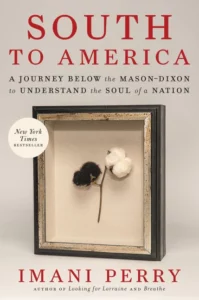 South to America: A Journey Below the Mason-Dixon to Understand the Soul of a Nation Imani Perry (Ecco) $28.99 OUR SALE PRICE= $23.19
South to America: A Journey Below the Mason-Dixon to Understand the Soul of a Nation Imani Perry (Ecco) $28.99 OUR SALE PRICE= $23.19
I close with this suggestion even though, technically, it is not about the Red-State / Blue-State divide, the alt-right, or offering Christian insight into navigating our differences regarding white Christian nationalism and the like. But, somewhat like Red State Christians, it is a travelogue, memoiristic and at times a deeply impressionistic glimpse into 16 different American regions (and a bonus of her trip to The Bahamas and Havana.) From Annapolis to Memphis to Atlanta to North Carolina to Mobile to Louisville to Florida to Birmingham and more, her chapters are long, with first hand color and local interest with lots of backstory and serious history. It is, as the impressive and reliable Isabel Wilkerson says, “an elegant edition on the complexities of the American South — and thus of America.”
“An elegant edition on the complexities of the American South — and thus of America.”
It is indeed elegant; I will name it as one of my favorite books of 2023, doubtlessly, but not only because it was mostly enjoyable for its fine and at times lush writing. More, it was because she introduced me to so much black history that I had only heard of in spurts or only knew a slight bit of. From the experience of blacks in Appalachia to the racism in her town of Princeton NJ to the glories of Fisk to her ruminations on the deeper south, South to America is eye-opening, amazingly full of truth and love.
And yet, as a few reviewers have noted, she speaks of our “land of big dreams and bigger lies.” Uh-huh.
I have previously highlighted South to America: A Journey Below the Mason-Dixon to Understand the Soul of a Nation and tried to assure readers it was well done, entertaining, even — Oprah called it “radiant” — but exceedingly important. I will do so again, listing it here as an anecdote to our failures to understand others. Here, Dr. Perry is writing about race and, as one of the great public intellectuals working today, she has much to teach us, regardless of your race. Most white folks, especially, I think, will be sobered and informed and be taken up in its good prose and vivid, instructional storytelling. As Natasha Trethewey (of the intense memoir Memorial Drive) notes, it is “part pilgrimage, part elegy, and a clarion call.”
South to America marks time like Beloved did. Similarly, we will talk not solely of books about the south, but books generally as before or after South to America. I have known and loved the South for four decades and Imani Perry has shown me that there is so much more in our region’s fleshy folds to know, explore and love. It is simply the most finely crafted and rigorously conceived book about our region, and nation, I have ever read.” — Kiese Laymon, author of Heavy
++++
TO PLACE AN ORDER
PLEASE READ AND THEN CLICK ON THE “ORDER HERE” LINK BELOW.
It is helpful if you tell us how you prefer us to ship your orders.
The weight and destination of your package varies
but you can use this as a general guide:
There are generally two kinds of US Mail options, and, of course, UPS. If necessary, we can do overnight and other expedited methods, too. Just ask.
- United States Postal Service has the option called “Media Mail” which is cheapest but can be slow. For one typical book, usually, it’s about $3.69; 2 lbs would be $4.36.
- United States Postal Service has another option called “Priority Mail” which is $8.35 if it fits in a flat rate envelope. Many children’s books and some Bibles are oversized so that might take the next size up which is $8.95. “Priority Mail” gets much more attention than does “Media Mail” and is often just a few days to anywhere in the US.
- UPS Ground is reliable but varies by weight and distance and may take longer than USPS. We’re happy to figure out your options for you once we know what you want.
If you just want to say “cheapest” that is fine. If you are eager and don’t want the slowest method, do say so. It really helps us serve you well.
– DON’T FORGET TO LET US KNOW WHAT SHIPPING METHOD YOU PREFER –
BookNotes
SPECIAL
DISCOUNT
20% OFF
ALL BOOKS MENTIONED
+++
order here
this takes you to the secure Hearts & Minds order form page
just tell us what you want to order
inquire here
if you have questions or need more information
just ask us what you want to know
Hearts & Minds 234 East Main Street Dallastown PA 17313
read@heartsandmindsbooks.com
717-246-3333
It is complicated for us, but we are still closed for in-store browsing due to our commitment to public health (not to mention the safety of our staff and customers.) The vaccination rate here in York County is sadly lower than average and the new variant is now spreading; rates are rising seriously. Our store is a bit cramped without top-notch ventilation so we are trying to be wise and faithful.
Please, wherever you are, do your best to be sensitive to those who are most at risk. Many of our friends, neighbors, co-workers, congregants, and family members may need to be protected since more than half of Americans (it seems) have medical reasons to worry about longer hazards from even seemingly mild Covid infections.
We are doing our famous curb-side customer service and can show any number of items to you if you call us from our back parking lot. We are eager to serve and grateful for your patience as we all work to mitigate the pandemic.
Of course, we’re happy to ship books anywhere. Just tell us how you want them sent.
We are here 10:00 – 6:00 EST / Monday – Saturday, closed on Sunday.

